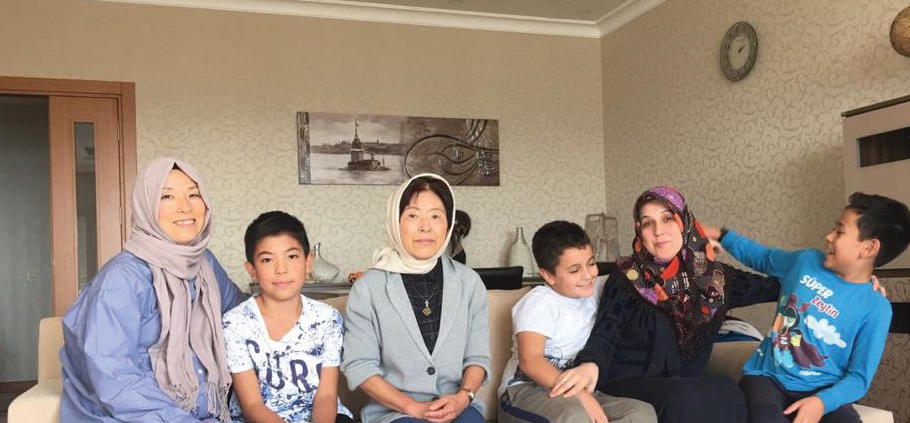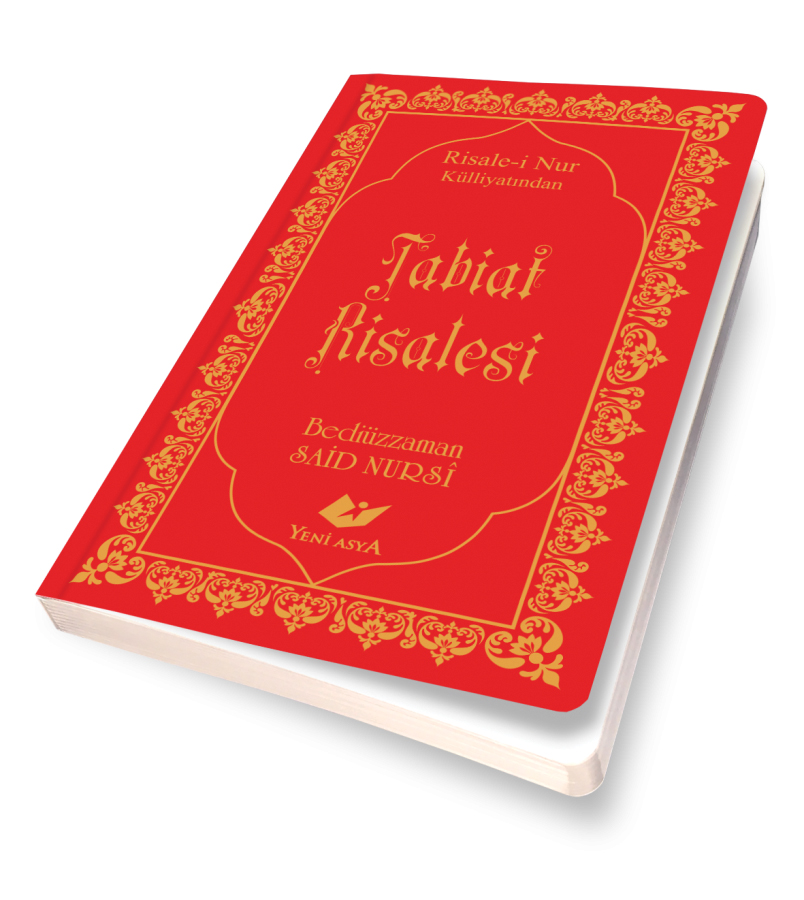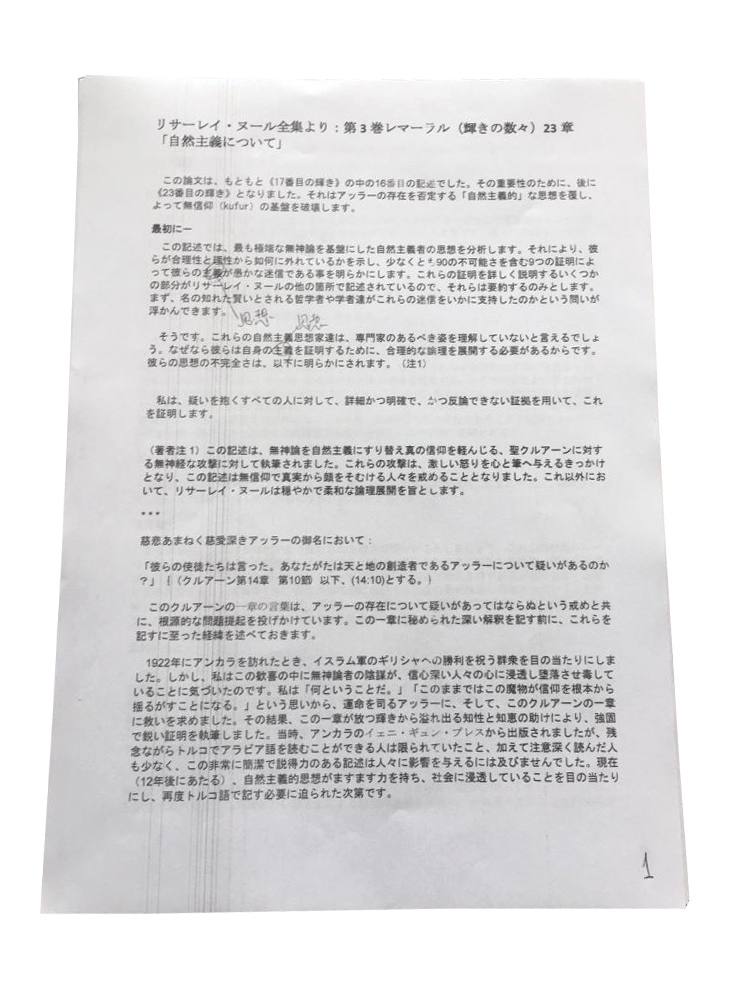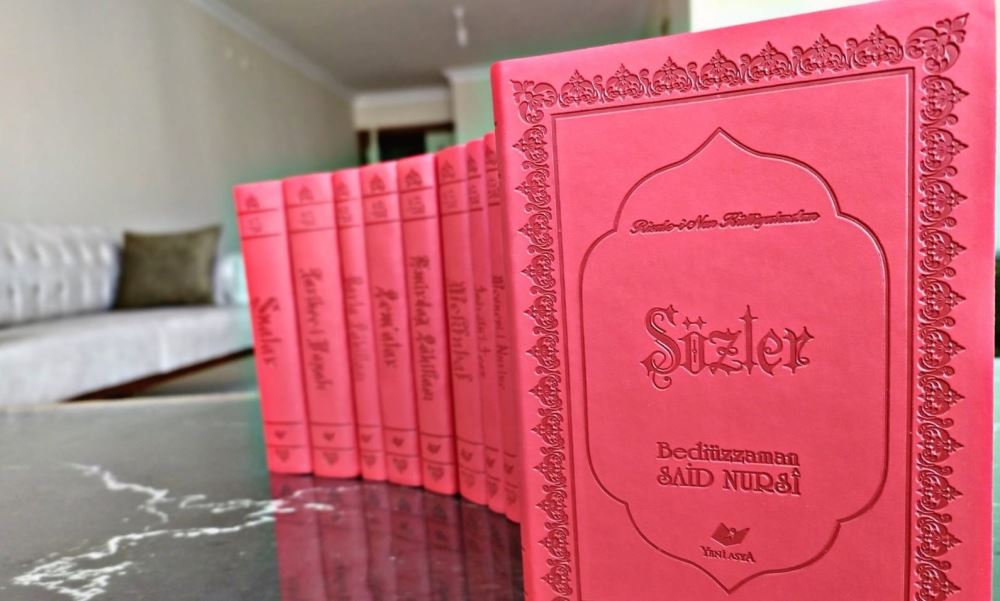Tomoko İkeda (Hatice Demir) who Translate Risale-i Nur book Nature Cause-and-Effect in Japanese Language, said "Risale-i Nuru changed my perspective about everything" only the person with very sharp and clever intellect can write the book like Nature Cause-and-Effect.
Tomoko Ikeda (Hatice Demir), who translated the Nature Treatise into Japanese: “The treatises changed my perspective on everything. The Treatise of Nature is very cleverly written. A sharp-witted person could write that."
What has changed in your life after you became a Muslim?
People cry when they're happy, I've never cried. But after I became a Muslim, I cried many times with happiness. You cry for the greatness of Allah, you cry for His mercy. "Is that what you thought of me?" you say, you cry to him.
I started praying a week after I became a Muslim. I told Süleyman to teach me the prayer times and I started right away, alhamdulillah. I learned the kind of things that children learn by going to the mosque, the conditions of Islam, and reading the Qur'an.
At that time, I was more interested in dhikr. I have never read it Risale-i Nur on my own because I could not understand
Did you feel any change after taking sahadah?
The pamphlets. I bought printed books on Islam from Japan. There were books like Sahih Bukhari. Mashallah, the translation of the Qur'an I mentioned before and these hadith books were very well prepared.
I felt. I felt that I was under the protection of God. I was feeling this until then, but saying the word sahadah was a transition to a different state for me.
IT WAS NOT EASY TO ENTER THE HIJAB
 Also, you have an journey of entering the hijab. How did this happen?
Also, you have an journey of entering the hijab. How did this happen?
Hijab was something I never wanted to think about. Before I became a Muslim, I said, "Okay, I believed it, but let me put this veiling thing aside." And at the very beginning, “Is the hijab correct? What is it like?” I wasn't very sure. It was difficult for me. I was a foreigner, maybe God would forgive… But of course, my conscience was not very clear. I always blamed myself for saying I can't do this. Hijab is something very different for the Japanese. “What will my family say? My Japanese friends I met here they would turn me down and cut off their relations with me,” I thought, which is how it happened. I was a little scared of that. Well, I prayed. I was praying a lot back then; “My God, I can't do this in my life right now. It's very hard for me, you know it's hard. I'm a thinker. Can you give me a year? After a year, I will decide and do something.”
A year later, I started wearing hijab again during Ramadan. But I repented a lot during that year. Because God ordered it, I don't do it. On the one hand, I was sad; you believe, but you can't, you think what someone else will say… When I was in a state of sadness, there was the Ladies' Guide, but I didn't have the courage to read it either. Why is that? Because I couldn't get close to convince me. So I was so afraid of wearing hijab. But somehow Allah answered my prayer, and I began to see the beauty of the hijab. I hadn't noticed until then. For example; Ugly and beautiful are two extremes. Hijab narrows the gap between the two. It reduces the difference between the old and the young, the poor and the rich - of course, I'm not talking about the situation in Turkey right now. - They all cover up with the same thing. For example, when a person wears something black, it is not very noticeable who is poor and who is rich. These kinds of things started to come to my mind one by one. I thought the hijab was a logical convenience for people. For example, when I wasn't wearing hijab, I would be depressed all day because I had a bad hair day. I would be offended if someone is watching. I realized that it is also difficult to go outdoors. When I saw these, I said, "This (hijab) is probably true." I realized that the hijab is important between husband and wife and for the healthy continuation of the marriage. I also thought of this; women wear hijab, but men also wear things on their heads. Both Christians and religious Jewish women cover their heads. So there is a deep meaning to this, not just socially. And with faith it will happen, I thought it will get easier. I realized that it is also difficult to go outdoors.
 At that time, I was a new Muslim, I was very diligent to learn something. I was very excited to learn something and realized these things about hijab and after accepting that it was true, I started to repent. You know it's right, but you don't, there's a contradiction here. But where will you go? To the grave. So, it is necessary not to think about what other people will say, parents, friends, neighbors. But I couldn't. Reason and conscience say these things, but the my bad desire say “No, no. I can't,”.
At that time, I was a new Muslim, I was very diligent to learn something. I was very excited to learn something and realized these things about hijab and after accepting that it was true, I started to repent. You know it's right, but you don't, there's a contradiction here. But where will you go? To the grave. So, it is necessary not to think about what other people will say, parents, friends, neighbors. But I couldn't. Reason and conscience say these things, but the my bad desire say “No, no. I can't,”.
Such a year has passed, Ramadan has come. I was fasting with love and excitement. I spent a little more this year like a person; with dhikr, with prayer. In those days, I didn't think much about the logic of things. Of course, I was learning something, but I was not reading things like Risale. For the first time, I thought logically about hijab, I was convinced, I believed. I read a Ladies' Guide, then I closed it and put it aside because I was afraid. Every day I repented and went to bed. I was always dreaming beautiful dreams close to the end of Ramadan. The thing that convinced me the most was one of these dreams. That day I woke up in the morning, went to buy a headscarf. The next day, we were going to meet one of my Japanese friends in Turkey. “Whow,” I said. “I don't want her to see me like this” I thought that she would cut off her relationship with me and spread it to her friends, and I would be upset, but that day I covered up hair and left again. She was also surprised “Oh, are you covered up? What happened?" she said, but she did not want to open any topic about Islam. After that day She cut off her relationship with me.
I went to Japan for the first time in a few months. I was under a lot of stress. Because there is no such person in the town where I live, there is no Muslim. At that time, my parents were driving to the airport, they were shocked. "What happened? Did Süleyman covered you up? they said. I told them, “What kind of religion is Islam? What kind of people are Muslims, how do they live? I started to tell. They, too, saw only Süleyman as a Muslim. “Süleyman is a good person. You believed it too, we have nothing to say. From what you describe, it looks like a good religion.” My mom was a little annoyed about the hijab. “This is like persecuting women, being forced by men,” she thought. There is no such thing, it is Allah's order; I told about the aspects that came to my mind before, such as bringing the poor and the rich closer, and reducing the difference between the beautiful and the ugly. My mother is an open-minded person. “Oh, I get it,” she said immediately. And “I am so proud of you. You did things for God that no one else could do," she said.
SHOULD I TRY IT?
A few years later, my mother came to visit with my father. It was summer, I got used to it, of course. I go out to the window and to the balcony my head coverd. My mom looks at me, “Should I give it a try too?” she said. “What will you try?” “Should I try on a headscarf too? I was wondering.” “Well, try it.” She wears short pants with open sleeves, but a headscarf. Then came; “I liked it very much. It was very good, I felt very comfortable. My hair turned bad, it turned white you never think, it covers up your flaws, ”she said. She wore a headscarf every day and went out.
My father was also positive. He said, "I like Süleyman very much anyway, and we are very happy with your situation after you became a Muslim." He wanted me to send him the Japanese translation of the Quran. I sent.
We know that your mother converted to Islam about two months ago. How did that happen?
My mother always looked positive. She even prayed for a while. “Should I try too?” he said. I taught the suras and prayers, I said that you will do it like this. I said the prayer times of Japan. She was praying and fasting five times a day. But she was not a Muslim. Yet she wanted to live it. She also said that she always wanted to wear a hijab, she wore it in winter. It's cold because no one is looking. But the summer is hot, and in the summer she only wore a hat. My mother approached Islam very well. For example, if you are not a Muslim, why would you fast? But she wanted to feast, so I said "feast".
Then my father had a big accident. The doctor said he might die. When my mother started to stay in the hospital with my father, she stopped praying. She stayed in the hospital for 6-7 months. I said, “If he loves prayer so much, she fasts. If I ask my mother, will she become a Muslim?" I thought. I asked her, she said "I'm not ready". "Because I don't know that much." she says there is a Creator, but logically she says there is only one, but "Is Islam the true religion or not?" I guess she wasn't sure. Because she hadn't read a book herself, it was just what she heard from me. This incident was about 10 years ago.
“I BECOME A MUSLIM”
After this accident, my father continued to deteriorate. The last time he had a heart attack a month or two ago, they decided to have an angiogram. I called my mom the morning of my dad's surgery. “My father did not look at Islam coldly, on the contrary, he was warm. I thought, "He can die now," I wanted him to bring the Word of Shahada. If I were there, I would definitely make him say that. But I'm not there, "Can you tell him?" I talked to my mother. “You become a Muslim just by saying this (Kelime-i Shahada). I would be very pleased if you would make my father say this." Then my mother said herself; “I will be a Muslim.”
 Of course I couldn't believe it. "What!" I said, “(Kelime-i Şehadet) Can you tell me?” “Yes, I will,” she said. she said it very confidently. My mother is 74 years old and Islam is something far away for the Japanese. We do not know Islam at all. It is not easy for someone at that age to change religion… We live far from religion. For example, Christian missionaries are trying to spread their religion. Japan is probably the most difficult country.
Of course I couldn't believe it. "What!" I said, “(Kelime-i Şehadet) Can you tell me?” “Yes, I will,” she said. she said it very confidently. My mother is 74 years old and Islam is something far away for the Japanese. We do not know Islam at all. It is not easy for someone at that age to change religion… We live far from religion. For example, Christian missionaries are trying to spread their religion. Japan is probably the most difficult country.
So, how did you meet the Risales and start reading?
The treatises were very difficult for me. I didn't understand anything, not at all. When I went to class, I understood very little, but there were days when I couldn't understand anything because I couldn't concentrate. But I was going. I also liked that everyone could learn science in this way.
Before I became a Muslim, someone was taking me. After I became a Muslim, I went voluntarily. I never did personal reading. If a guest who came to the house read it, I would listen to it, that way. I also had children, my day and night were mixed together. There were times when I could barely even pray. I couldn't sit and read a lot.
8-9 years ago, I went to another congregation's class. Again, the community of Risale-i Nur, of course. They were reciting the collection alternately. “Will you join too?” they said. I said, "Well, I'll agree, but I've never read the Risale." That's how I started. But I didn't understand at all. "It's okay. You read,” they said. Anyway, it's over, I'm starting to understand a bit like this. There are also easy places that even children can understand. When I read those kinds of places, I thought, "I'll keep going". I still continue. After that, I started to attend classes regularly. The friendship relations there have been a very good thing for me. You know, it's not like a normal friend, it's like they are united at the root. The thing about "loving for God's sake", that's exactly what I feel.
PROBLEMS ARE ALWAYS SOLVED
What do the treatises mean to you? Which aspect catches your attention?
After I started reading the pamphlet, my life became much easier. It reduced my stress. You enjoy it when you read, and you enjoy it when you go to class. Then the Treatises changed my perspective on everything. For example; evil is not evil. No, it is not. You don't know, it all depends on you. I learned it. The topics covered in the treatises are universal issues. It's not just for Muslims, it's for everyone. This is a great treasure, which is read by so many people in Turkey and around the world. I see that there is everything in the Risales. For example, is there a problem between husband and wife? It is resolved. Problems with children and neighbors are always solved. What's wrong with man? It all dissolves, that's what he teaches. Alhamdulillah we are in the right place. For this, we must strive for unity; We should not strive to be divided. You are different, it should not be said that I am different.
The Qur'an is a whole. The part represents the whole. So are the treatises. That's why one can learn a lot by reading a part of it. It's a bit human. Did he think about it? Thinking is very important. When you think, the door opens. Because you want it. God gives to those who ask.
And if I hadn't read the Risale, I would have stayed the same. There would be no progress. When you read Risale-i Nur, you learn things you didn't know. You know you are not alone, you are moving forward. Learning these things is completely suitable for our nature. For example, let's say I just attended the course, I'm still very profitable. Because I hear and learn something in that lesson. But think when it's not like that; You have become a Muslim, you have learned about prayer, fasting, conditions, things to be considered, and dhikr, but you live alone, at home as a Muslim. Is this a good thing? It's not, is it? Islam is a social religion. That's what researchers say.
When I read the translation of the Qur'an, I read it with excitement, you learn what you don't know there. I felt the same when I read the pamphlet. I was reading it with excitement, because I did not know.
 Did you feel this excitement before you understood the treatises?
Did you feel this excitement before you understood the treatises?
No, I felt excitement after I started to understand. Before I knew it, there was a calmness on me. I thought I should read it, even if I didn't understand it. People around me were also reading, of course I was influenced by them. There are many parts in the pamphlets that I still do not understand. But when you read the Treatises, you look through its window, then the problems are solved.
NATURE WAS LIKE A CORE FOR ME
You also translated the Treatise of Nature from Turkish to Japanese. How did this develop, how did you start, how long did it last?
A professor in America from the yeni Asya community translated the Treatise of Nature into English. My husband brought this translation. They have a group called "Overseas services". They are trying to translate the treatises into German, French and other languages. because I'm Japanese, my husband said, “You translate this into Japanese too.” But it is not an easy thing of course. It took about 10 months. At first I said I can't do it, then I thought I'd give it a try. Because I live in such a way that I almost forget Japanese. I didn't believe I could do anything. I didn't understand all of the Treatise of Nature anyway, so I thought how to translate it. I have read some paragraphs maybe a hundred times. But it's been very good for me. During this period, I read a lot of Nature, it was like a seed for me. Now, whatever I read, I think of Nature, I say, "Hah, this was in Nature".
After you started the translation, you worked by comparing the Turkish book with an English and an old Japanese translation. What were the deficiencies you saw in those translations?
Those translations were not very clear. They removed some parts, made some parts like summaries, changed them. The general purpose is clear, of course, but “Well, so? What did you want to say?" A question like this arose. Also, do Turks immediately understand Nature when they read it?
The Treatise of Nature is very cleverly written. Only a sharp-witted person can write this. It is very important that philosophers know and see their ideas and the basis of those ideas is irreligion. For example, the Japanese cannot see this.
Translating this has been a great lesson for me, it has been very good. As I said, I forgot some words because I don't use Japanese much in daily life. While translating, some words popped into my mind. However, I still cannot say "It's complete" for the translation, there are places I want to change even more.
May Allah grant you success in your endeavours. Thank you very much for your answers.
I thank you.
Interviewed by Emine Sultan Çakır
Translated by Gevriye Shamsidden / Texas